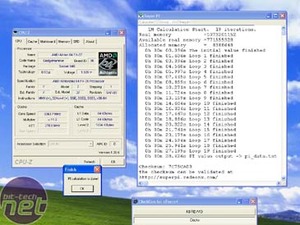
Overclocking:
We managed to overclock our Athlon 64 FX-57 from its default 2.8GHz clock speed to over 3.0GHz without a great deal of problem by a simple multiplier adjustment. The processor was stable at this speed with a slight increase in core voltage from 1.40v to 1.43v in every application that we threw at it, with the exception of the mother of all torture tests: Prime 95.In order to get the CPU stable in Prime 95 at 3.0GHz, we had to increase the core voltage to 1.54v. We managed to get it stable here for a little over one hour. If you are looking for complete stability, we found that 2955MHz was the highest that we could get Prime 95 to continuously loop overnight. We achieved this clock speed at 211x14.0.
We also attempted to overclock both the CPU and front side bus to see how far we could go for a SuperPI 1M benchmark. This was by no means stable, but it should give the extreme enthusiast's something to mull over. These tests were all completed with the stock PIB cooling solution that was provided with the processor.
With a better cooling solution, we are sure that the Athlon 64 FX-57 will be capable of more than this, much more.
Value
Value isn't normally a word associated with a high-end CPUs and certainly based on our results, you would be hard pressed to find anyone who could say the FX-57 represents good value. Overclockers UK sell the San Diego-cored FX-55 for £587 inc vat, and are offering the FX-57 for pre-order at an eye-watering £763.69 inc vat: £176 more than the previous king of the hill. In other words, the price has gone up 30% but the clockspeed only 7%.When you consider that an Athlon 64 4000+ featuring the same 90nm San Diego core, can be had for around £340, things don't look too rosey for the FX. At best, it is a mere 15% faster in current games, but only when tested as settings so low that nobody would play them at. With the eye-candy turned up, it is essentially no faster in real world gameplay than the the 4000+, which is less than half the price.
The FX-57 is priced very closely the the dual-core Athlon 64 X2 4800+. Admittedly, our tests show the X2 to be marginally slower than even the FX-55, but once multi-threaded applications become the norm, we would expect the X2 to really shine.
Pricing in the US appears to be some 20% lower the UK, thanks to the exchange rate: Newegg haven't listed the FX-57 yet, but the FX-55 is US$818 (£454 vs £587) and the 4800+ is a mere $1065 - that's £592 vs £752!
Final Thoughts...
In general, there is not a great deal to say about the Athlon 64 FX-57, other than that it is "more of the same, but faster". The new San Diego core should allow for much more mileage than the ageing SledgeHammer core in both overclocking and in future additions to the FX-series line up.There is not a great deal of need for AMD to do anything other than make a slightly faster gaming CPU every 6 months. Some may say that it is boring, but it just goes to show that they have little or no competition in gaming benchmarks, and they are spreading their wings in an attempt to capture other areas of day-to-day computing from Intel.
That begs the question though – what happens next? Will the next Athlon 64 FX be a single core CPU, or will it be a dual core Toledo-based CPU? Right now, we don't honestly know, but AMD seem intent on ensuring that the Athlon 64 FX is the highest-performing gaming CPU that they produce, so we suspect that we will have to wait for the FX-61 before we see a dual core Athlon 64 FX.
There is certainly the scope for an FX-59 based on the San Diego core as our early Athlon 64 FX-57 was very close to being stable at 3GHz, only falling over when we attempted to run Prime 95 for any great length of time.
In terms of speed, we can say that the FX-57 is a suitable replacement for the FX-55. It's certainly not a cheap processor, and some may feel that money can be spent better elsewhere when costing up a high-end gaming system on a budget.
However, after the release of NVIDIA's GeForce 7800 GTX last week, we will have to revisit how CPU limited that video card is in both single card and dual card configurations. We may find that the GeForce 7800 GTX is more susceptible to how fast your CPU is, and that you will need to have a fast CPU in order to get the most out of your GeForce 7800 GTX.
It is without doubt the fastest gaming processor available today, and there are bound to be people who look to invest in the Athlon 64 FX-57 – you will not be disappointed with your purchase. However, there are some unanswered questions with regard to CPU limitations with the all-new GeForce 7800 GTX that we will attempt to cover in the near future.

MSI MPG Velox 100R Chassis Review
October 14 2021 | 15:04







Want to comment? Please log in.